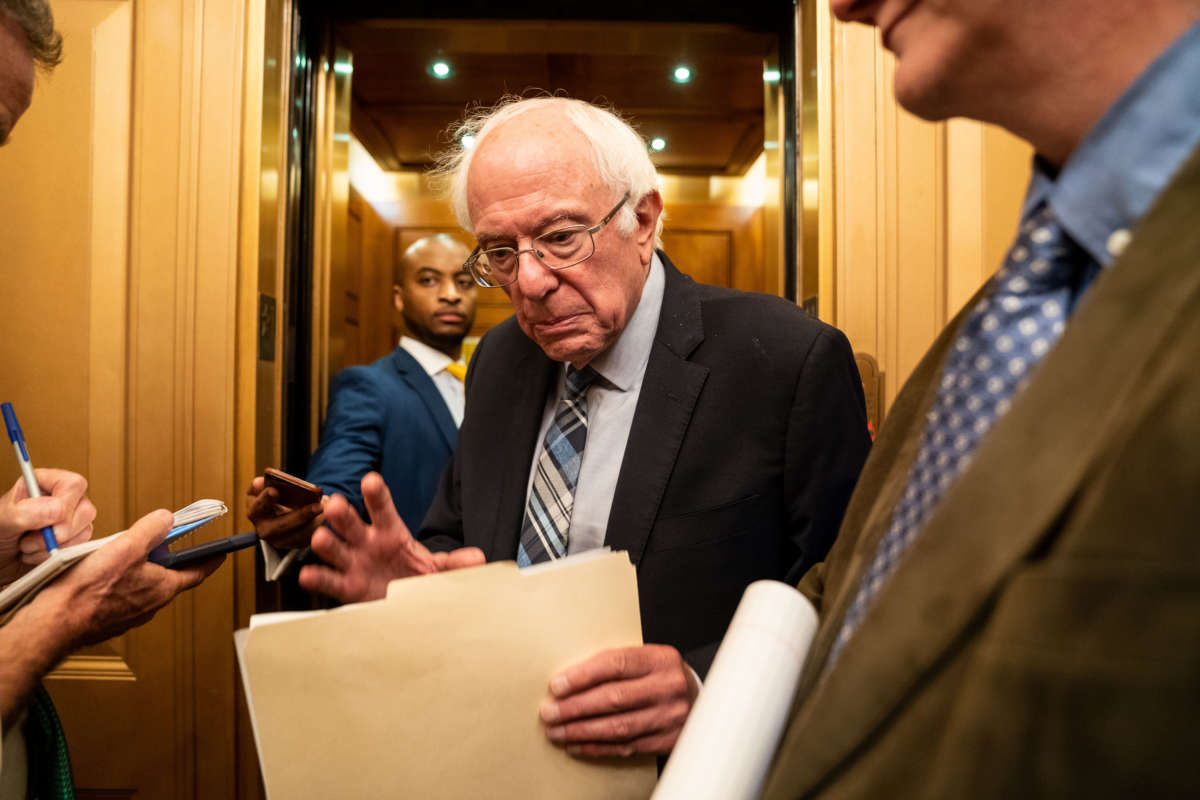For a while this summer, it looked as though all was right among Democrats in Congress after an agreement was reached to support one thing: the $3.5 trillion reconciliation bill, spearheaded by Sen. Bernie Sanders (I-Vermont). But, in recent weeks, conservative Democrats have slowly come out against it, in one way or another, and are slated to put up a fight against its price tag as committees begin drafting the bill.
Sen. Kyrsten Sinema (D-Arizona) has been the most vocal in her opposition, saying last month (and reiterating recently) that she opposes the $3.5 trillion price tag, and that it’s not up for debate. Sinema has been widely criticized for her stance — a month ago, she was the first Democrat to come out against it — but she is steadfast in her opposition. Her conservative ally in the Senate, Joe Manchin (D-West Virginia), has also said that he has “serious concerns” over the price tag for the bill.
Sanders, however, is determined to keep the price tag — and he, too, says it’s not up for debate. “I already negotiated. The truth is we need more,” he told Politico in an interview Wednesday. “The needs are there. This is, in my view, the minimum of what we should be spending.”
Sanders is in the middle of a tour of midwestern Republican-leaning states to sell voters on the reconciliation bill. The bill enjoys majority support among the public, including the support of nearly all Democrats, according to a recent poll.
The GOP “understand[s] that what we’re doing is enormously popular, that the American people are sick and tired of the government working overtime for the wealthy and the powerful,” said Sanders. “The contrast is pretty clear. And we’re gonna win that.” He thinks that the popularity of the bill and its ambitious proposals will help the Democrats’ chances in the midterm elections.
The Vermont progressive has become somewhat of a tour de force since President Joe Biden took office, allying closely with the White House. Progressive policies like the ones Sanders pushes are generally popular among the public, after all.
“Trust me, there are a lot of differences in the Senate among the Democrats,” Sanders said. “But at the end of the day, every Democrat understands that it is terribly important that we support the president’s agenda. And most of these ideas came from the White House.” But, he also pointed out that the Democratic majority in Congress is extremely slim.
Indeed, many of the proposals in the reconciliation bill, which was advanced recently by both the House and the Senate, are taken from Biden’s original infrastructure proposal from the spring. Provisions like raising taxes on the wealthy to pay for the bill and a federal paid family leave program were included in the reconciliation bill after conservative Democrats and Republicans cut them out of the bipartisan infrastructure package.
Today, the infrastructure bill is only as large as it is because of Sanders’s influence, lawmakers said in July. He had originally proposed a $6 trillion price tag, which more moderate Democrats had negotiated down. “Bernie Sanders is like a human embodiment of shifting the Overton Window,” Sen. Tim Kaine (D-Virginia), said in July. “We wouldn’t be there without him putting out $6 trillion.”
On the current price tag, then, there’s no backing down again for the senator, or for progressives in the House. “[E]very single thing” in the plan is of crucial importance, he told Politico, like the child tax credit extension and Medicare expansion. At the end of the day, the price tag is “non-negotiable” for him, Sanders said.
Sanders will have to contend with some of the most stubborn conservatives in the Democratic caucus — Manchin, Sinema, and their more quiet allies — who have gained a reputation for gutting the Democratic agenda. Sinema has said that even the threat from progressives in the House to kill her infrastructure bill doesn’t faze her if she can get what she wants on reconciliation.
As of now, though, it appears that the House progressives outnumber the conservative Democrats who ally with Manchin and Sinema in their apparent goals to weaken or sabotage the reconciliation bill. Progressive representatives have vowed to shoot down the infrastructure bill if the reconciliation package doesn’t end up being what they negotiated for. And, as Rep. Alexandria Ocasio-Cortez (D-New York) has pointed out, there are “dozens and dozens” of them — and only a handful of conservative Democrats.
Media that fights fascism
Truthout is funded almost entirely by readers — that’s why we can speak truth to power and cut against the mainstream narrative. But independent journalists at Truthout face mounting political repression under Trump.
We rely on your support to survive McCarthyist censorship. Please make a tax-deductible one-time or monthly donation.
